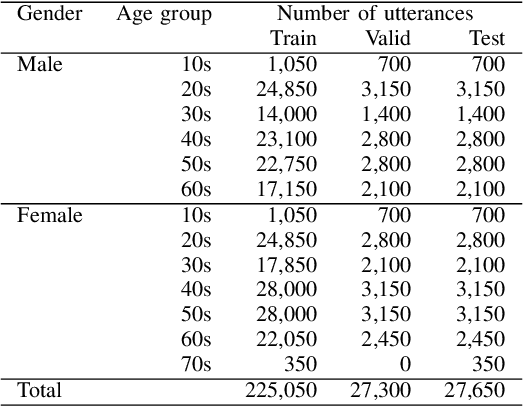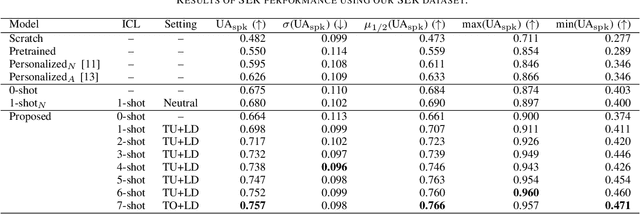Taiga Yamane
Difference Vector Equalization for Robust Fine-tuning of Vision-Language Models
Nov 13, 2025



Abstract:Contrastive pre-trained vision-language models, such as CLIP, demonstrate strong generalization abilities in zero-shot classification by leveraging embeddings extracted from image and text encoders. This paper aims to robustly fine-tune these vision-language models on in-distribution (ID) data without compromising their generalization abilities in out-of-distribution (OOD) and zero-shot settings. Current robust fine-tuning methods tackle this challenge by reusing contrastive learning, which was used in pre-training, for fine-tuning. However, we found that these methods distort the geometric structure of the embeddings, which plays a crucial role in the generalization of vision-language models, resulting in limited OOD and zero-shot performance. To address this, we propose Difference Vector Equalization (DiVE), which preserves the geometric structure during fine-tuning. The idea behind DiVE is to constrain difference vectors, each of which is obtained by subtracting the embeddings extracted from the pre-trained and fine-tuning models for the same data sample. By constraining the difference vectors to be equal across various data samples, we effectively preserve the geometric structure. Therefore, we introduce two losses: average vector loss (AVL) and pairwise vector loss (PVL). AVL preserves the geometric structure globally by constraining difference vectors to be equal to their weighted average. PVL preserves the geometric structure locally by ensuring a consistent multimodal alignment. Our experiments demonstrate that DiVE effectively preserves the geometric structure, achieving strong results across ID, OOD, and zero-shot metrics.
Joint Modeling of Big Five and HEXACO for Multimodal Apparent Personality-trait Recognition
Oct 16, 2025Abstract:This paper proposes a joint modeling method of the Big Five, which has long been studied, and HEXACO, which has recently attracted attention in psychology, for automatically recognizing apparent personality traits from multimodal human behavior. Most previous studies have used the Big Five for multimodal apparent personality-trait recognition. However, no study has focused on apparent HEXACO which can evaluate an Honesty-Humility trait related to displaced aggression and vengefulness, social-dominance orientation, etc. In addition, the relationships between the Big Five and HEXACO when modeled by machine learning have not been clarified. We expect awareness of multimodal human behavior to improve by considering these relationships. The key advance of our proposed method is to optimize jointly recognizing the Big Five and HEXACO. Experiments using a self-introduction video dataset demonstrate that the proposed method can effectively recognize the Big Five and HEXACO.
Few-shot Personalization via In-Context Learning for Speech Emotion Recognition based on Speech-Language Model
Sep 10, 2025



Abstract:This paper proposes a personalization method for speech emotion recognition (SER) through in-context learning (ICL). Since the expression of emotions varies from person to person, speaker-specific adaptation is crucial for improving the SER performance. Conventional SER methods have been personalized using emotional utterances of a target speaker, but it is often difficult to prepare utterances corresponding to all emotion labels in advance. Our idea to overcome this difficulty is to obtain speaker characteristics by conditioning a few emotional utterances of the target speaker in ICL-based inference. ICL is a method to perform unseen tasks by conditioning a few input-output examples through inference in large language models (LLMs). We meta-train a speech-language model extended from the LLM to learn how to perform personalized SER via ICL. Experimental results using our newly collected SER dataset demonstrate that the proposed method outperforms conventional methods.
End-to-End Joint Target and Non-Target Speakers ASR
Jun 04, 2023


Abstract:This paper proposes a novel automatic speech recognition (ASR) system that can transcribe individual speaker's speech while identifying whether they are target or non-target speakers from multi-talker overlapped speech. Target-speaker ASR systems are a promising way to only transcribe a target speaker's speech by enrolling the target speaker's information. However, in conversational ASR applications, transcribing both the target speaker's speech and non-target speakers' ones is often required to understand interactive information. To naturally consider both target and non-target speakers in a single ASR model, our idea is to extend autoregressive modeling-based multi-talker ASR systems to utilize the enrollment speech of the target speaker. Our proposed ASR is performed by recursively generating both textual tokens and tokens that represent target or non-target speakers. Our experiments demonstrate the effectiveness of our proposed method.
 Add to Chrome
Add to Chrome Add to Firefox
Add to Firefox Add to Edge
Add to Edge